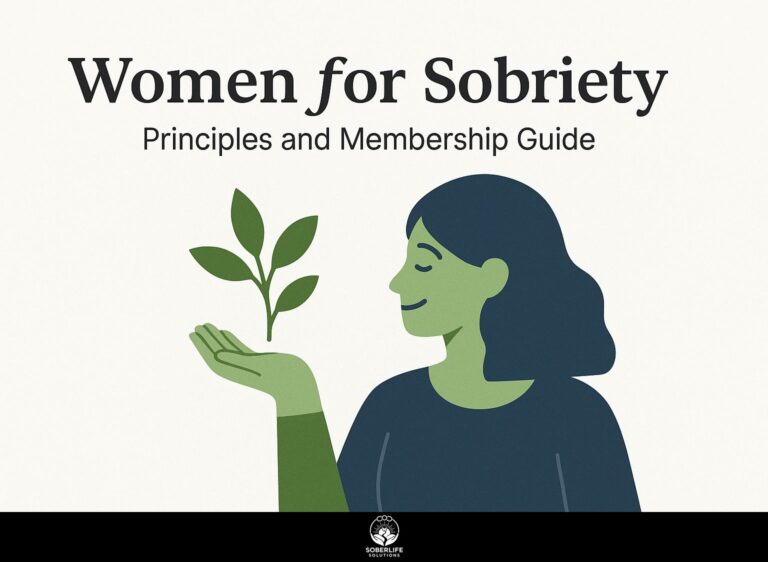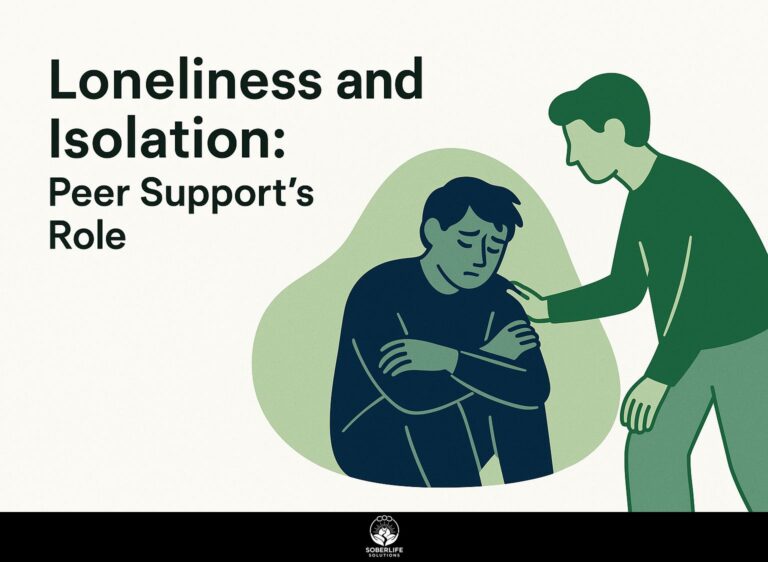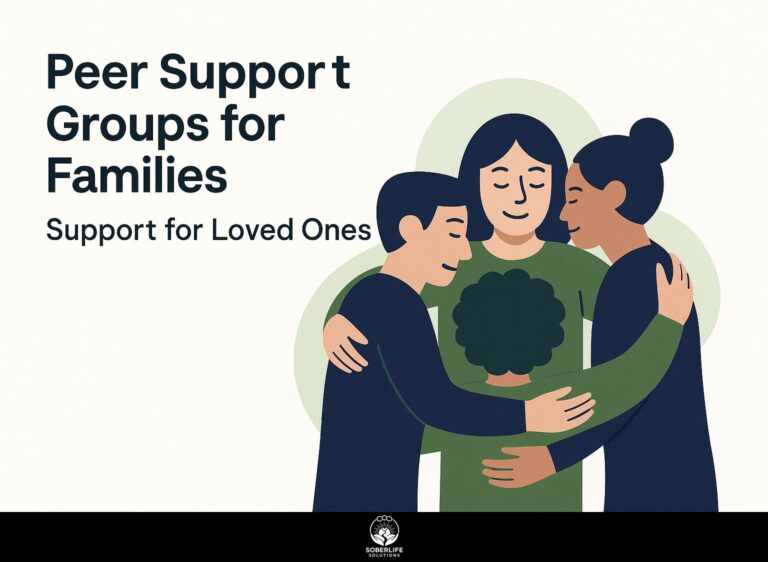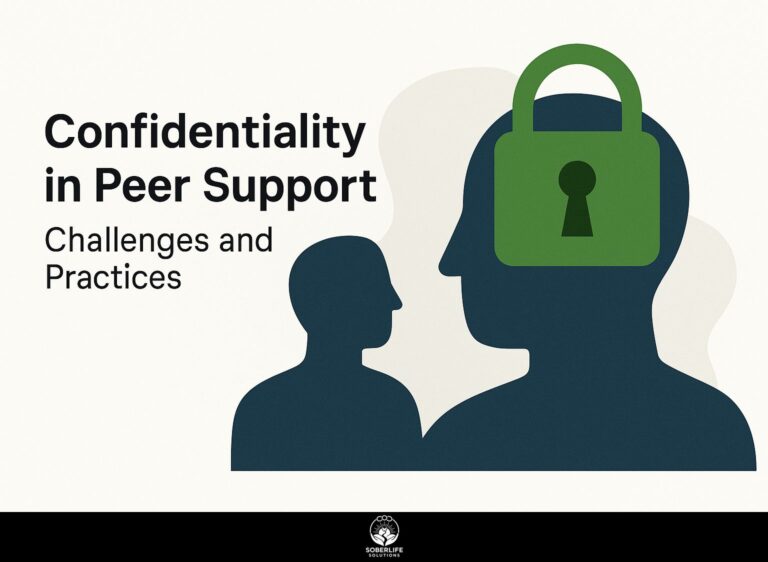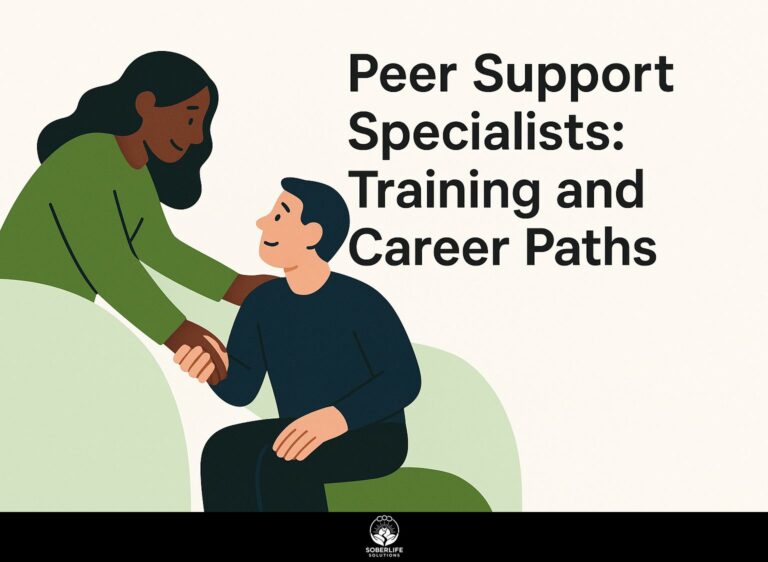Peer Support: Certification, Policies, and Training
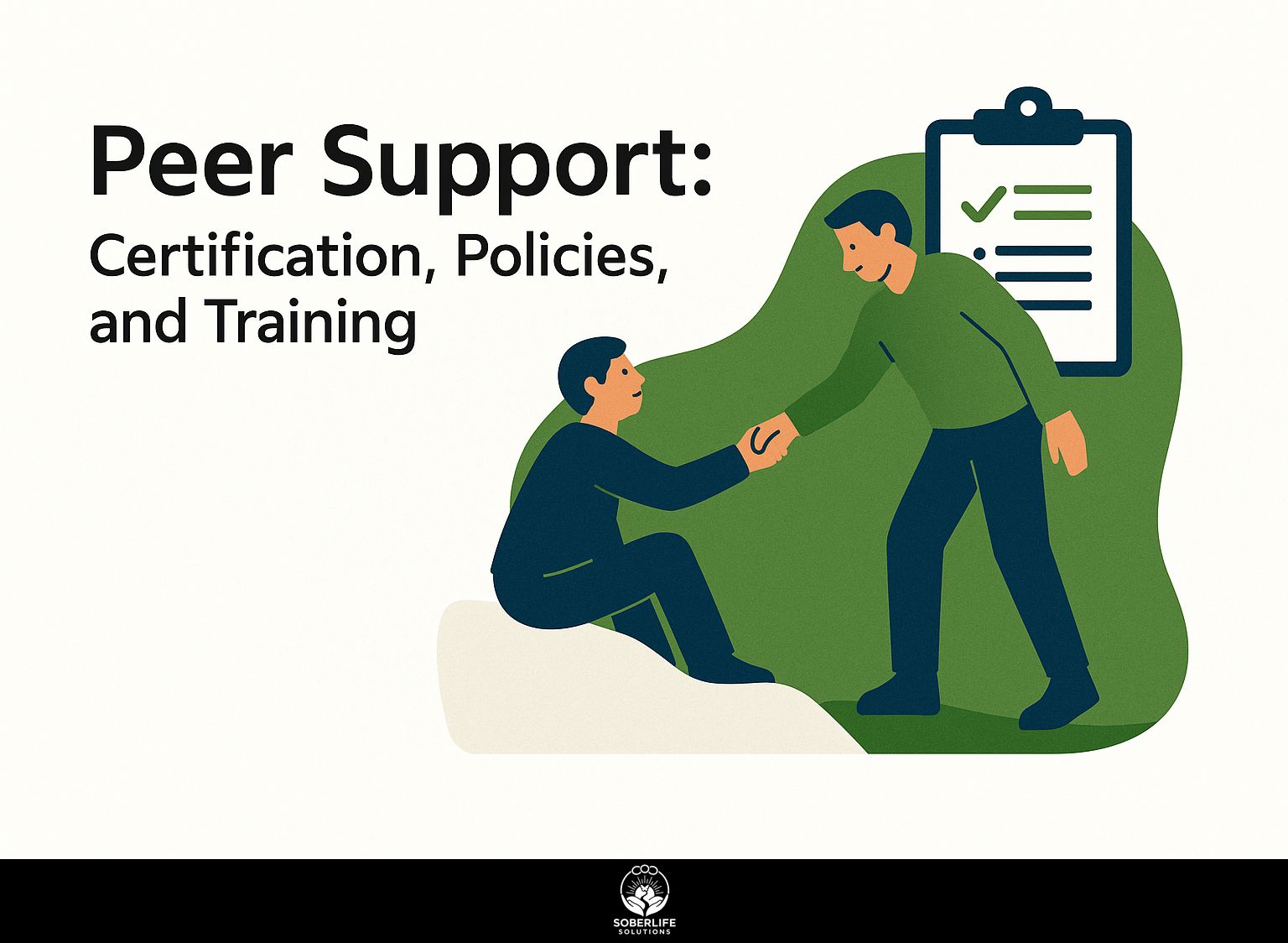
Introduction to Peer Support
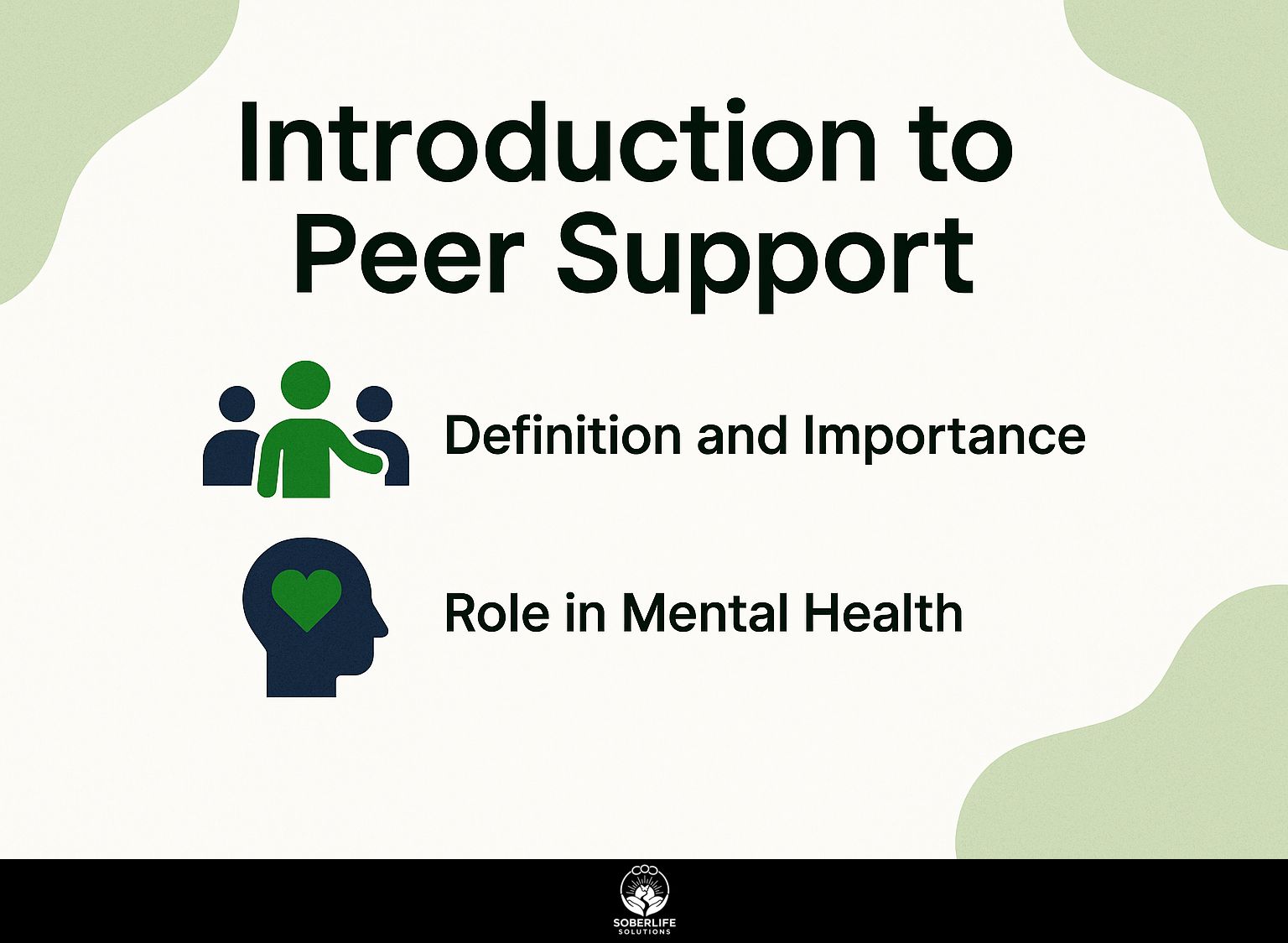
Peer support is very important in mental health recovery, helping people by sharing experiences. As Peer Support Specialists and Certified Family Support Partners, these committed volunteers provide essential advice and empathy. This article looks at certification standards, important policies from groups such as the National Association of Peer Supporters, and useful training programs. Learn how these parts come together to improve how peer supporters help in achieving real recovery.
Key Takeaways:
Definition and Importance
Peer support is when people share their personal experiences to help others manage their recovery process, playing an important part in mental health groups.
Organizations like the National Alliance on Mental Illness (NAMI) and Mental Health America (MHA) offer peer support programs where individuals connect through shared experiences.
For instance, NAMI’s Family-to-Family program helps families understand mental health conditions and improve communication strategies.
Support groups run by peers motivate members to share methods they use to manage challenges, helping create a feeling of community.
These programs recognize the importance of personal stories, improving individual recovery and strengthening community support, demonstrating that help is both accessible and successful.
Role in Mental Health
Peer supporters play an important role in mental health care by complementing standard therapy with their own personal experiences and advice.
These supporters can work as peer coaches, offering individual help and setting goals, and family advocates, helping relatives make sense of mental health issues.
Studies show that adding peer support cuts hospital readmission rates by half and greatly increases how satisfied patients are. The effectiveness of such support is affirmed by a systematic review published by Cambridge University Press, which highlights the significant improvements in patient outcomes.
For example, programs like the National Certified Peer Specialist (NCPS) program teach people how to help others, showing the strong effect these roles have on mental health results.
Certification for Peer Support Specialists
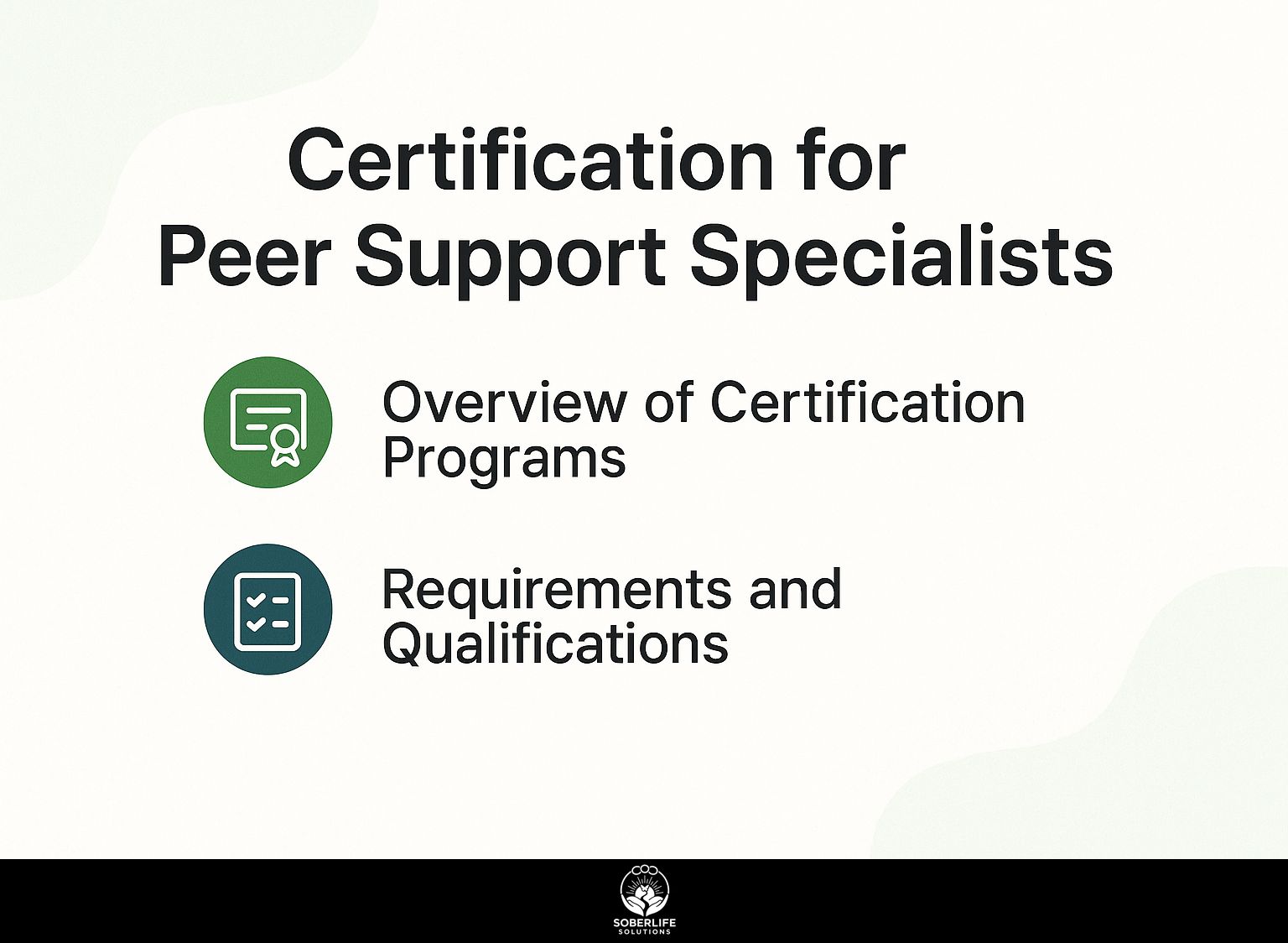
Certification for peer support specialists is important for maintaining standard quality and training in various places.
Overview of Certification Programs
There are various certification programs available to officially recognize the training of peer support specialists. These programs include the NCCPSS Program and the Mental Health and Addiction Certification Board of Oregon.
The NCCPSS Program costs around $300-$400. Participants need to complete at least 40 hours of training and update it every three years.
In contrast, the Mental Health and Addiction Certification Board of Oregon offers a less intensive program for $100-$250, requiring 30 hours of training and similar renewal criteria.
Both certificates demonstrate competency in peer support, enhancing job prospects within the mental health field. Participating in these programs proves skills and builds a more connected community by sharing knowledge and experiences.
Requirements and Qualifications
To become certified, peer support specialists must meet specific educational and experiential requirements, including a minimum of 50 hours of training and documented lived experience.
Along with training, candidates often need to complete a written exam and at least 500 hours of supervised peer support work. Requirements can vary by state; for example, California mandates training from an approved institution, while Florida emphasizes recovery experience.
A checklist for typical prerequisites includes:
- Completion of a training program
- An application submitted with references
- Successful passing of the certification exam
Aspiring specialists should check the guidelines from their state’s health department to follow the rules.
Policies Governing Peer Support
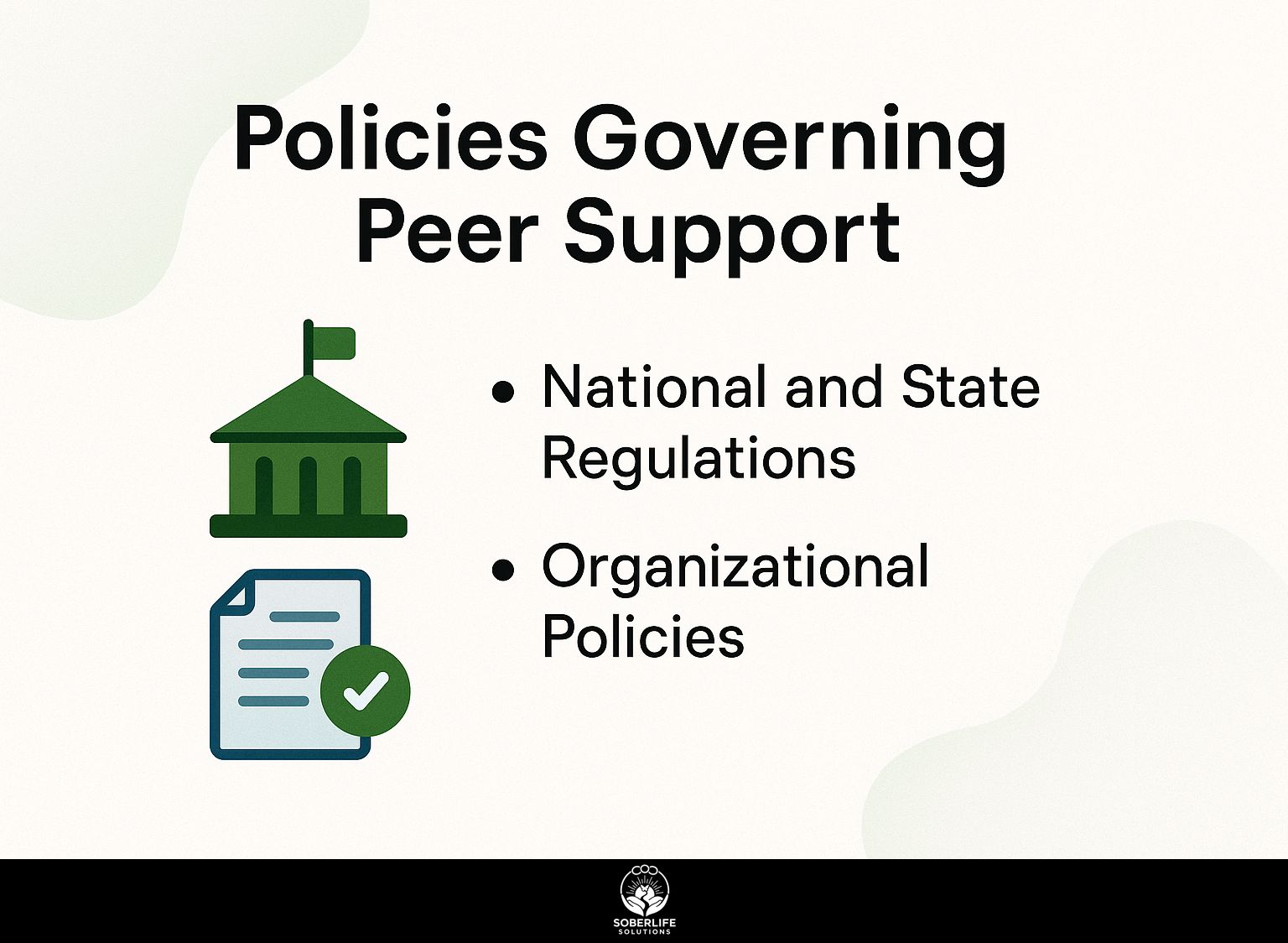
Guidelines for peer support specify how experts operate, ensuring accountability and ethical behavior. These guidelines often define distinct roles within the support structure, which can be explored further in our elaboration on Peer Support Roles: Specialists, Advocates, Providers.
National and State Regulations
Regulations vary by state but are often influenced by national standards set by SAMHSA, focusing on ethical practices in peer support. According to SAMHSA’s core competencies for peer workers, maintaining these standards is crucial for effective service delivery.
For example, Idaho allows peer support specialists to work with little oversight, encouraging them to operate more independently. Unlike other places, Oregon has tougher rules. People must be certified and continue their education to keep high standards.
This difference means that practitioners in Idaho may face fewer compliance challenges, while those in Oregon must complete extra training and certifications.
Consequently, organizations should tailor their practices to meet state-specific regulations, ensuring both adherence and effective service delivery. Grasping this is key for running a program effectively and avoiding legal issues.
Organizational Policies
Individual organizations also establish rules that control peer support roles, which can improve or restrict how well peer specialists work.
For instance, a community organization might implement clear guidelines for peer specialists, specifying training requirements and defining responsibilities. This method builds trust and reliability, improving service quality.
Good practices involve holding regular sessions for supervision and feedback to help improve skills. Many organizations have peer specialists join monthly team meetings to talk about challenges and successes.
Another effective strategy is creating an open-door policy, encouraging peer specialists to voice concerns and suggestions. These practices help organizations change their peer support services based on immediate feedback, leading to better results.
Training Programs for Peer Support
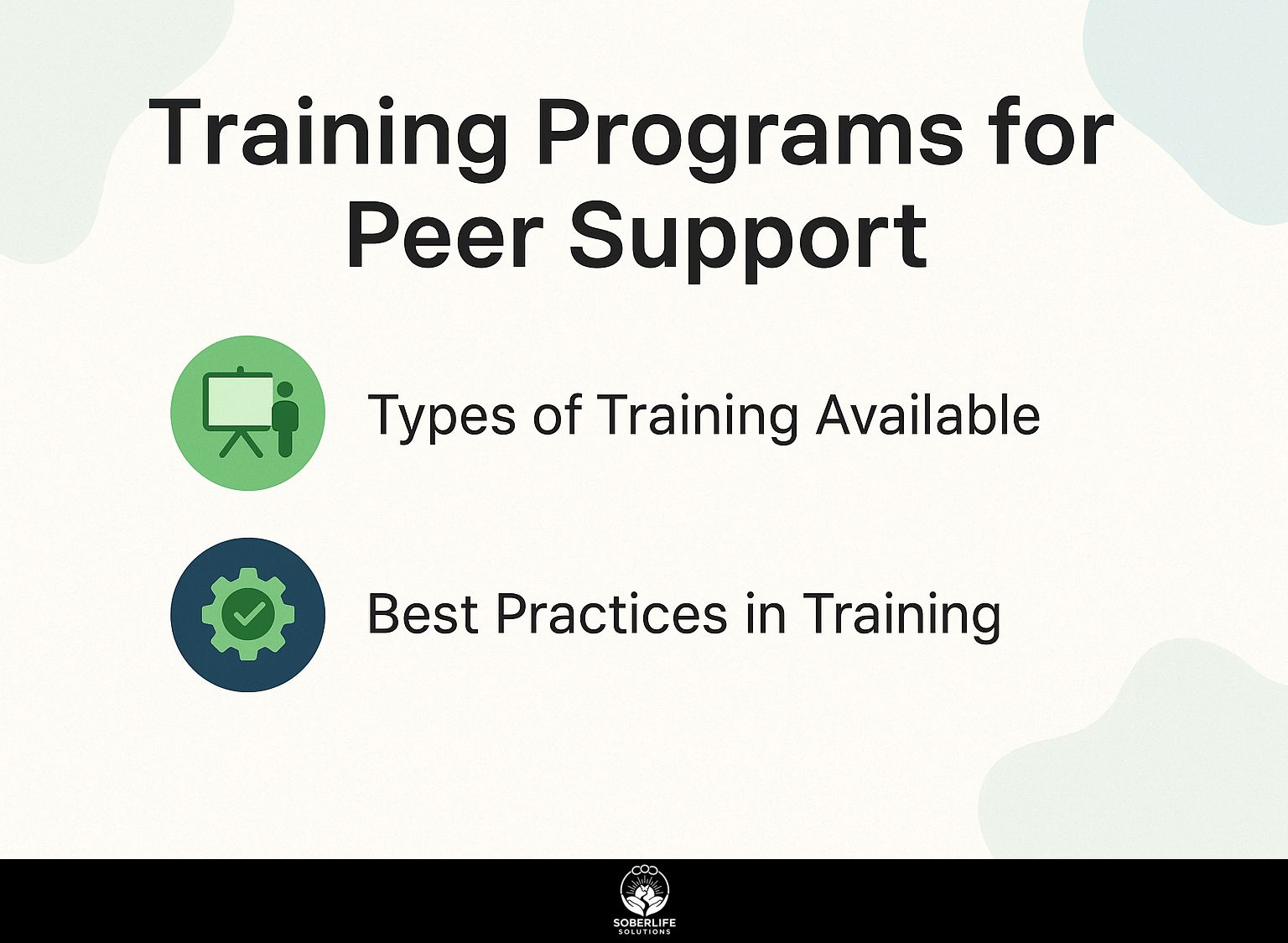
Training programs are essential for teaching peer support specialists the skills and information they need to help others well. To understand the diverse roles these specialists can undertake, explore more about Peer Support Roles: Specialists, Advocates, Providers.
Types of Training Available
Various training types exist, including foundational courses for certified peer specialists and specialized training for youth and family peer advocates.
For example, SAMHSA provides free online courses that cover the essential skills needed for certified peer specialists. These courses typically take about 8-10 hours to finish, as detailed by their Learning Center.
Local community organizations, such as mental health advocacy groups, may provide weekend workshops for family peer advocates priced between $50-$200 per session, typically lasting 6 hours.
University certification programs can provide thorough training for both positions, with prices between $1,000 and $3,000, covering 12 to 16 weeks of lessons.
These options cater to diverse training needs depending on your schedule and budget.
Best Practices in Training
Ensuring that peer support specialists learn through effective training methods prepares them to address the different needs of their communities.
To make training more effective, include ethics training that emphasizes respect and confidentiality. Include interesting role-playing exercises that mimic real-life challenges, giving experts a chance to try out their skills in a secure setting.
Continuous feedback loops should be established to assess competencies regularly, ensuring ongoing development. Statistics show that implementing these practices can improve service delivery by up to 40%, enhancing both client satisfaction and peer specialist confidence.
This thorough training helps create a supportive environment, key for meeting the challenging needs of the community.
Challenges and Barriers
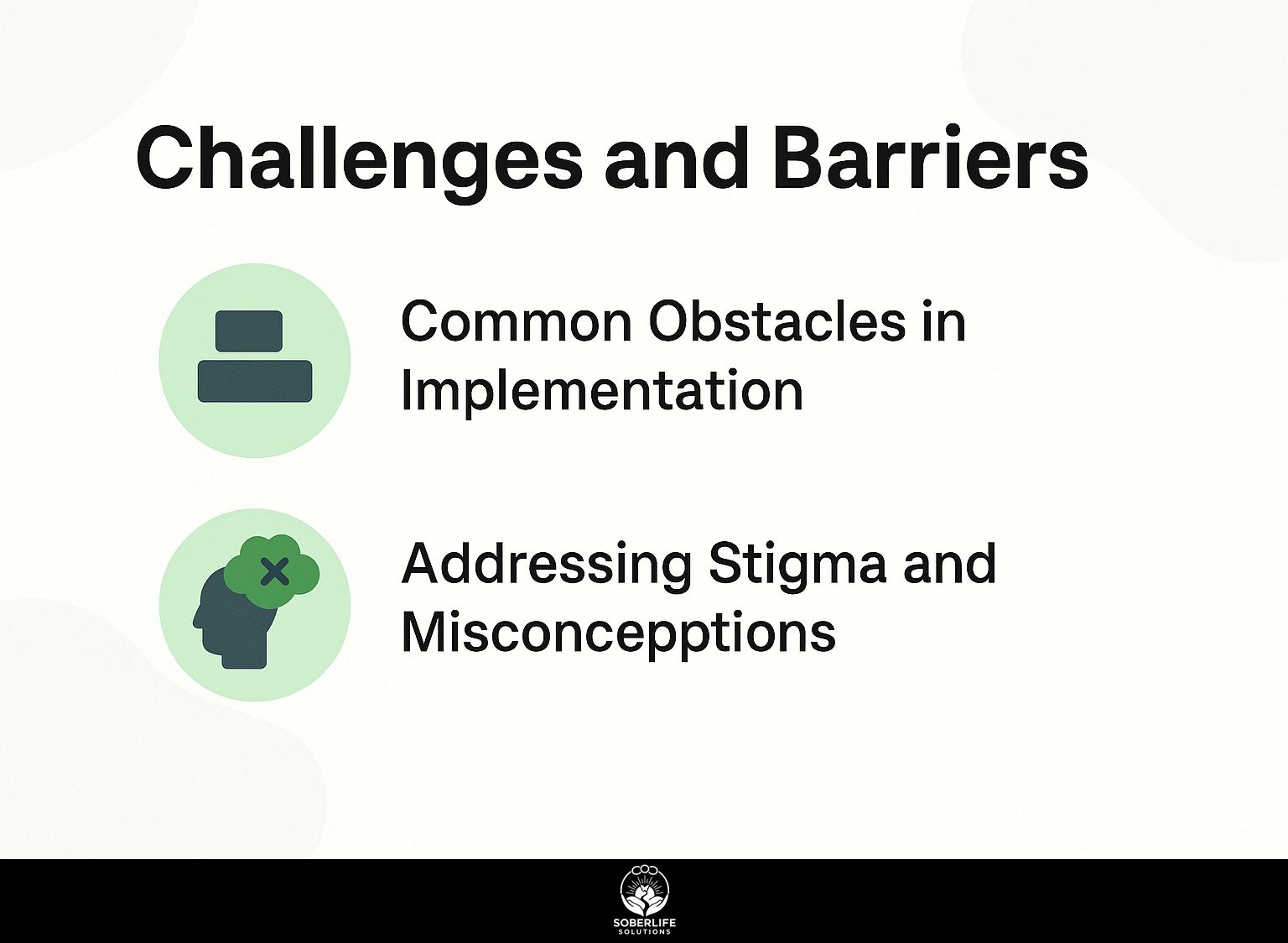
Even with their advantages, many problems make it hard to successfully run peer support programs in communities. If you’re interested in understanding the role and impact of these peer support systems, you might find our insights on peer support in detox centers valuable.
Common Obstacles in Implementation
Common obstacles such as funding limitations, lack of awareness, and inadequate training can significantly impede peer support implementation.
To overcome funding limitations, consider applying for grants specifically aimed at community support initiatives. For instance, the Robert Wood Johnson Foundation offers various funding opportunities.
To address lack of awareness, organize informational workshops or webinars showcasing the benefits of peer support, utilizing platforms like Zoom or Google Meet.
Offer specific training programs by collaborating with well-known organizations that focus on peer support methods. Incorporating resources like the ‘Peer Support Training Manual’ can help deliver essential skills effectively.
Addressing Stigma and Misconceptions
It’s important to tackle the negative views about mental health and encourage support from friends to increase acceptance and involvement in recovery programs.
Effective strategies include community education initiatives and personal storytelling as powerful tools. For instance, workshops aimed at dispelling myths about mental health can lead to a 25% increase in acceptance, as evidenced by a study from the National Alliance on Mental Illness.
Platforms such as social media can spread personal stories that connect with many people, encouraging empathy and comprehension. Working with local mental health groups to hold events can help connect people better, change how the public views mental health, and motivate more people to ask for support.
Future Directions in Peer Support
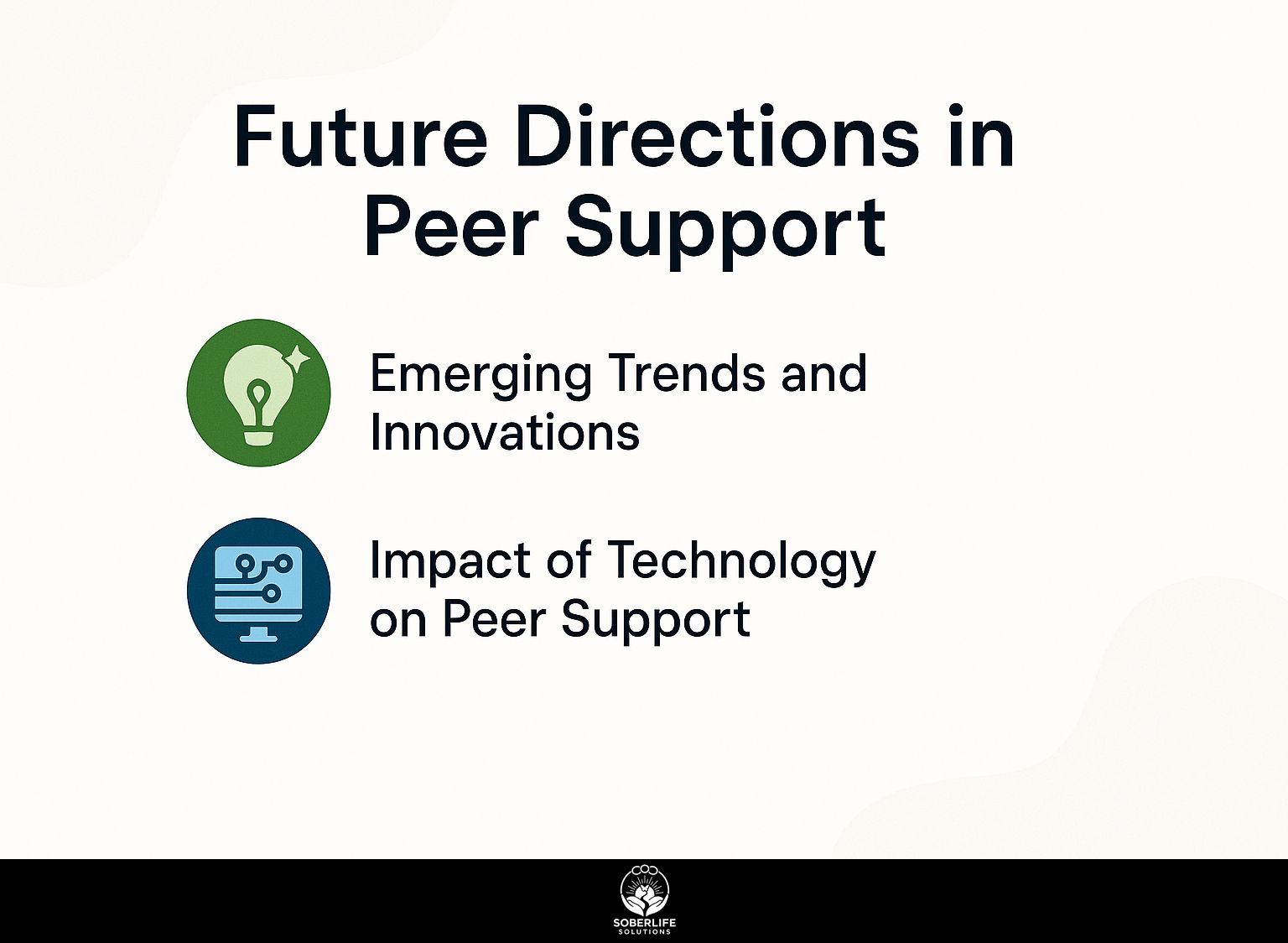
The outlook for peer support is promising, with upcoming changes and improvements expected to make services better and easier to use. In particular, the evolution of different peer support roles-whether as specialists, advocates, or providers-plays a crucial role in this transformation.
Emerging Trends and Innovations
Emerging trends such as digital peer support platforms and online communities are expanding the reach of peer support services.
Platforms like 7 Cups of Tea have seen significant growth, reporting over 1 million listeners and a 30% increase in engagement over the past year.
These services enable individuals to connect anonymously with trained listeners, providing emotional support anytime through mobile apps.
Community forums on platforms like Reddit and Facebook help people interact and share their personal experiences with each other. Research indicates that support from peers can improve mental health, offering a useful alternative or complement to traditional therapy.
Impact of Technology on Peer Support
Technology is changing peer support, allowing more people to connect and share experiences than before.
Platforms like Facebook Groups, Reddit, and Discord are enhancing peer support through specialized communities. For instance, Facebook Groups creates spaces for individuals with shared struggles, such as mental health challenges, to offer and receive support.
On Reddit, users can remain anonymous, which encourages open talks and lets them ask for help without worrying about being judged. Discord goes a step further with real-time chat and voice channels, facilitating immediate support among users.
These tools help people connect with others, share resources, and build a strong community, which improves their support systems.
Frequently Asked Questions
What is peer support?
Peer support is help given by people who have faced similar situations as the person needing help. It is based on the concept of peers helping peers, rather than professionals providing support.
Why is peer support important?
Peer support is important because it brings people together who have faced similar difficulties, creating a feeling of belonging and shared experience. It can also give a feeling of hope and confidence, as friends can be examples and guides for one another.
What is peer support certification?
Peer support certification is a process that verifies an individual’s knowledge and skills in providing peer support. It typically involves completing a training program and passing an exam to become a certified peer support specialist.
Who can become certified in peer support?
Anyone with lived experience and a desire to support others can become certified in peer support. This includes individuals who have personally overcome mental health challenges, addiction, or other life experiences that can benefit others.
Are there policies in place for peer support certification?
Yes, there are often policies and guidelines set by organizations or governing bodies for peer support certification. These may include specific training requirements, ethical standards, and continuing education requirements to maintain certification.
What type of training is involved in peer support certification?
Training for peer support certification can differ, but it usually covers active listening, setting boundaries, self-care, and learning about mental health conditions. It may also include practical skills for providing support, such as crisis intervention and conflict resolution.


